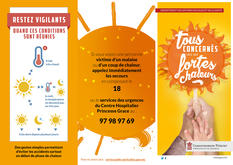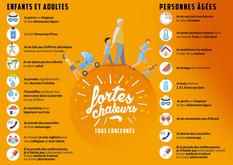- Homepage
- Social Affairs and Health
- News
- Heat Waves Can Endanger Our Health
Heat Waves Can Endanger Our Health
As it does every year at the start of hot weather, the Department of Health Affairs is implementing an information and prevention scheme to raise awareness of the risks of extreme heat.
Exposure to extreme heat is stressful for the body. The most serious complications are the risks of dehydration and heat stroke.
- 1. What risks are associated with extreme heat?
Extreme heat can affect your health.
Depending on a person's age, the body reacts differently to extreme heat.
When a person is elderly, their body does not perspire very much, and it is therefore difficult to maintain a temperature of 37°. As a result, body temperature can increase - there is a risk of heat stroke (hyperthermia – a temperature above 40° with altered consciousness).
In children and adults, the body perspires copiously to maintain the correct temperature. However, as a result, water is lost, with a risk of dehydration.
In addition, pregnancy, a number of diseases and the use of certain medications can have harmful effects on your health, in extreme heat. These issues should be discussed with your doctor and pharmacist.
Simple steps can prevent accidents, especially at the beginning of a heat wave. You should be prepared before the first signs of physical discomfort appear, even if they seem trivial.
- 2. What action should be taken in extreme heat?
- Protect yourself at the hottest times of the day
- avoid staying in the full sun;
- avoid going out during the hottest times of the day (from 11 a.m. to 5 p.m.) If possible, try to rest in a cool place at "siesta time";
- avoid energetic outdoor activities (such as gardening and DIY), and physical exertion;
- wear a hat and loose (cotton ) clothing in a light colour;
- keep your home cool (close the windows and shutters during the day and open them in the evening and at night if it's cooler)
- hang a wet towel by an open window;
- if the indoor temperature exceeds 32°C, fans will not counteract the intense heat, as they move the air around without cooling it and speed up dehydration;
- if possible, pour water on your terrace and balcony in the evening after sunset, particularly those that are west facing;
- check that your refrigerator is working correctly.
- Cool yourself down
- take cool baths or showers regularly (but not cold);
- moisten your body several times a day with a water spray or flannel;
- spend 2 to 3 hours a day in a cool place
- Drink and continue to eat
- drink at least 1.5 litres of water per day;
- drink water regularly – don't wait until you're thirsty;
- help the elderly, children and infants to stay hydrated;
- avoid drinking alcohol, coffee, tea, fizzy drinks and sugary drinks, as these can lead to dehydration;
- make sure you eat enough; choose cold food that contains a lot of water (such as fruit and raw vegetables);
- keep away from heat sources (such as an oven).
- Ask your doctor or pharmacist for advice
- before taking any medicines, even if they are on sale without a prescription;
- about any unusual symptoms.
- Ask for help
- at work, stay vigilant of yourself and your colleagues;
- give your family and friends regular updates, and, if necessary, don't be afraid to ask them for help immediately; if you feel unwell, contact the Fire and Emergency Service by dialling 112 (for yourself or for someone else in need).
Autres actualités du thème











